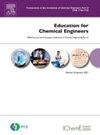Enhancing PFD comprehension for non-majors: An innovative approach using a petrochemical pilot plant
IF 2.3
2区 教育学
Q1 EDUCATION, SCIENTIFIC DISCIPLINES
引用次数: 0
Abstract
This study developed an innovative PFD education methodology utilizing an actual practical petrochemical plant and analyzed its effectiveness. The educational pilot plant located in Ulsan, South Korea, is used annually by 300 students and 1000 working professionals. It consists of equipment similar to real industrial settings, including storage tanks, heat exchangers, distillation columns, and pumps. The educational program comprises six lectures, where students learn by connecting actual equipment with PFD. Specifically, it is designed to help students understand the functions and principles of key equipment such as storage vessels, pumps, heat exchangers, and distillation columns in direct relation to the state, pressure, temperature, and material balance of substances in the PFD. To evaluate the educational effectiveness, a survey using a 5-point Likert scale was conducted, measuring changes in PFD comprehension, satisfaction with each chapter, and increase in confidence. The research results confirmed that this methodology is effective in significantly improving PFD understanding for non-majors and new employees. This study presents a new paradigm in chemical engineering education that effectively links actual processes with theoretical representations. It is expected to contribute to talent development and competitiveness enhancement in the chemical process industry.
提高非专业学生对PFD的理解:一种利用石化中试工厂的创新方法
本研究利用石化企业的实际情况,提出了一种创新的PFD教育方法,并对其有效性进行了分析。该教育试点工厂位于韩国蔚山,每年有300名学生和1000名工作专业人员使用。它由类似于实际工业环境的设备组成,包括储罐、热交换器、蒸馏塔和泵。教育计划包括六个讲座,学生通过将实际设备与PFD连接来学习。具体来说,它旨在帮助学生了解关键设备的功能和原理,如存储容器、泵、热交换器和精馏塔,这些设备与PFD中物质的状态、压力、温度和物质平衡直接相关。为了评估教育效果,使用5分李克特量表进行了一项调查,测量PFD理解的变化,对每章的满意度以及信心的增加。研究结果证实,该方法可以显著提高非专业和新员工对PFD的理解。本研究提出了一种化学工程教育的新范式,有效地将实际过程与理论表征联系起来。预计将有助于化学加工行业的人才培养和竞争力的提高。
本文章由计算机程序翻译,如有差异,请以英文原文为准。
求助全文
约1分钟内获得全文
求助全文
来源期刊

Education for Chemical Engineers
Multiple-
CiteScore
8.80
自引率
17.90%
发文量
30
审稿时长
31 days
期刊介绍:
Education for Chemical Engineers was launched in 2006 with a remit to publisheducation research papers, resource reviews and teaching and learning notes. ECE is targeted at chemical engineering academics and educators, discussing the ongoingchanges and development in chemical engineering education. This international title publishes papers from around the world, creating a global network of chemical engineering academics. Papers demonstrating how educational research results can be applied to chemical engineering education are particularly welcome, as are the accounts of research work that brings new perspectives to established principles, highlighting unsolved problems or indicating direction for future research relevant to chemical engineering education. Core topic areas: -Assessment- Accreditation- Curriculum development and transformation- Design- Diversity- Distance education-- E-learning Entrepreneurship programs- Industry-academic linkages- Benchmarking- Lifelong learning- Multidisciplinary programs- Outreach from kindergarten to high school programs- Student recruitment and retention and transition programs- New technology- Problem-based learning- Social responsibility and professionalism- Teamwork- Web-based learning
 求助内容:
求助内容: 应助结果提醒方式:
应助结果提醒方式:


